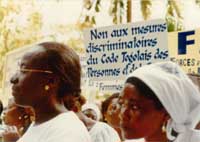Navigation
 Home
Home
 WHO WE ARE
WHO WE ARE
 OUR DEMANDS
OUR DEMANDS
 OUR ACTIONS
OUR ACTIONS
 OUR MAIN FIELDS OF ACTION: The Common Good and Access to Resources, Peace and demilitarisation, Women's Work and Violence against Women
OUR MAIN FIELDS OF ACTION: The Common Good and Access to Resources, Peace and demilitarisation, Women's Work and Violence against Women
 Become a member
Become a member
 News
News
 Agenda
Agenda
 Structure: IC, Countries and Participating bodies, International meetings
Structure: IC, Countries and Participating bodies, International meetings
 Newsletters
Newsletters
 Publications
Publications
 2000 - Sexism and Globalization, 2000 Good Reasons to March
2000 - Sexism and Globalization, 2000 Good Reasons to March
 2003 World Social Forum
2003 World Social Forum
 A Change of Course, The Millenium Development Goals (MDGs) through the Lens of the Women's Global Charter for Humanity, August 2005
A Change of Course, The Millenium Development Goals (MDGs) through the Lens of the Women's Global Charter for Humanity, August 2005
 A Score for Women’s Voices
A Score for Women’s Voices
 Advocacy Guide to Women's World Demands, 2000
Advocacy Guide to Women's World Demands, 2000
 Appeal of the World March of Women for the Construction of a Just, Equal, Cooperative, Democratic and Peaceful World
Appeal of the World March of Women for the Construction of a Just, Equal, Cooperative, Democratic and Peaceful World
 Changing the World Step by Step, 2000
Changing the World Step by Step, 2000
 ECONOMICS IN QUESTION: A WOMEN’S PERSPECTIVE
ECONOMICS IN QUESTION: A WOMEN’S PERSPECTIVE
 G8 AND WOMEN: WORLDS APART
G8 AND WOMEN: WORLDS APART
 Information about demand V-6 concerning sex trafficking of women and girls
Information about demand V-6 concerning sex trafficking of women and girls
 Information Document on Lesbian Rights (1999)
Information Document on Lesbian Rights (1999)
 Letter to Kofi Annan, UN General Secretary, October 17, 2000
Letter to Kofi Annan, UN General Secretary, October 17, 2000
 Letter to the IMF and the World Bank, October 16, 2000
Letter to the IMF and the World Bank, October 16, 2000
 Supporting Document 1 to the Charter
Supporting Document 1 to the Charter
 Supporting Document 2 to the Charter
Supporting Document 2 to the Charter
 The World March of Women 1998-2008: A Decade of International Feminist Struggle
The World March of Women 1998-2008: A Decade of International Feminist Struggle
 The World March of Women 2010 - Third International Action
The World March of Women 2010 - Third International Action
 WMW at the Global Forum on Financing the Right to Sustainable and Equitable Development
WMW at the Global Forum on Financing the Right to Sustainable and Equitable Development
 Women on the March, 2002
Women on the March, 2002

|
April 2002 - Eliminate Poverty in All Stages of Life
 |
|
Changing laws to change the world
Women's unequal status is written into law, or rather, into many laws since numerous sections of civil, family, criminal and labour codes confirm women's state of non-entitlement.
Some countries centred their demands around reforming codes. In Lebanon, the March took up the fight of having a single civil code adopted, a battle that began many years ago.
|

Equal rights presuppose overhauling civil codes. (Photo Elisabeth Blanchet) |
In Turkey, the women's movement scored a success when in November 2001 the civil code was amended and acknowledged the equality of spouses.
In Morocco, one of the issues presented at the huge march held in Rabat was the improvement of the status of women.
In Mozambique, the women participating in the March proposed that the government take into account the following considerations in the new family law: give marriage a role other than that of a union for reproductive purposes; disallow women from being sent back to their family of origin if they do not bear children; remove men's status as family head and give wives decision-making power; give women the right to administer the family's resources and to take part in decisions concerning the family; raise the minimum age to marry for girls, from 14 to 16, the same minimum age as for boys; recognize common-law, traditional and religious marriages; allow women to keep their possessions and land in the event of their husband's death or if they themselves are repudiated.
A long and exacting task! However, as Graça Machel, godmother of the March in Mozambique, pointed out at the launching of the March in Maputo: "The March is a process. We have the responsibility to seek changes in women's rights in the most hidden away spheres."
|

|
Copyrights
:
CC by-nc-sa 2.0
Last modified
2006-03-23 03:09 PM
This item is available in
Français,
English,
Español
|
|




